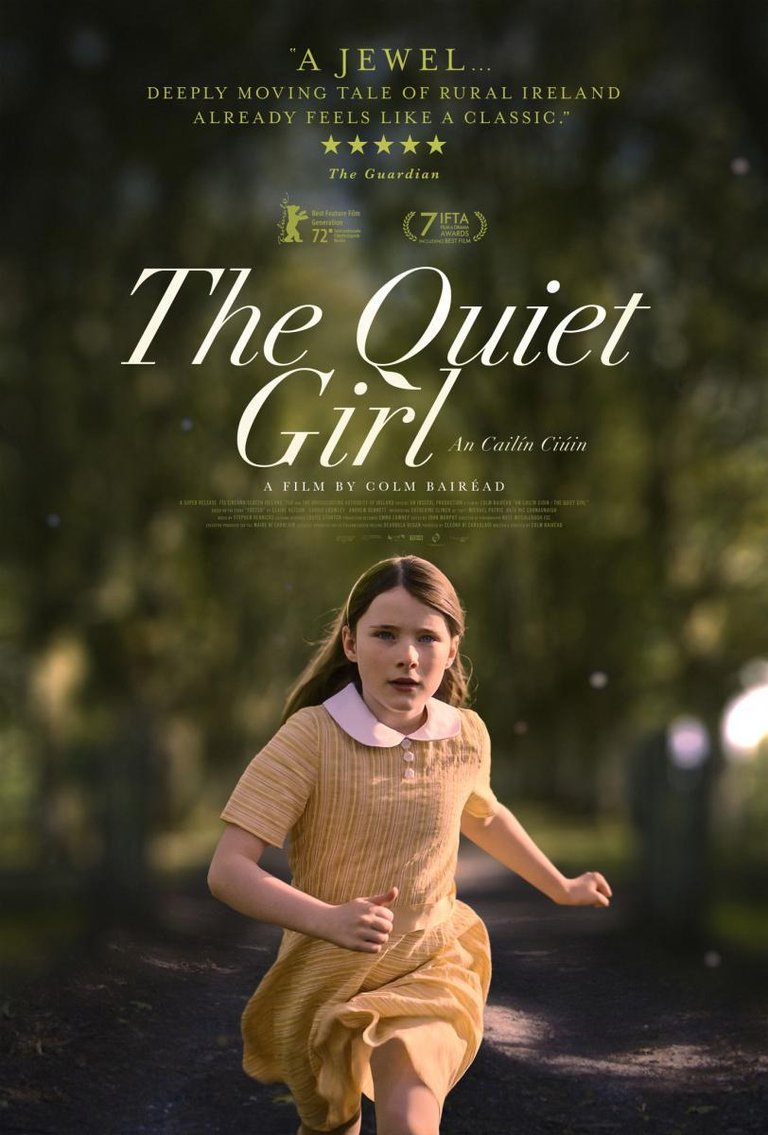
Nominada a Mejor Película Internacional en los Oscars 2022
There are currently several film festivals taking place in my city, some of them with free admission, but I haven't been able to attend due to work commitments that have coincided with the show times. And, of all the films that I have missed due to this misfortune, the one that hurt me the most was a double feature last week that included The Quiet Girl by Colm Bairéad and Afire by Christian Petzold, so I looked for them to see them on my own.
Actualmente se están desarrollando varios festivales de cine en mi ciudad, algunos de ellos con entrada gratuita, pero no he podido asistir por compromisos laborales que han coincidido con los horarios de las funciones. Y, de entre todas las películas que me he perdido por esta mala fortuna, la que más me dolió fue una función doble de la semana pasada que incluía The Quiet Girl de Colm Bairéad y Afire de Christian Petzold, así que las busqué para verlas por mi cuenta.
An Cailín Ciúin (The Quiet Girl) is a family drama made in Ireland that competed in different European and international festivals, even being nominated for the Oscars. The story is set in an unmentioned city in Ireland, but in a more country-like setting. The period is not very clear, but it is not contemporary, perhaps it is the late seventies or early eighties (judging by the clothing, the makes and models of the cars, the absence of mobile phones, etc.). In this environment we follow the life of Cáit, a nine-year-old girl who is not very loved - or at least not very well cared for - by the other members of her family. Her mother, her father, her three older sisters, and even some classmates at school see her as a weird girl. A priori, what stands out most about the girl is her passivity and her silence. It's her way of facing (running away from?) the things that happen to her. We see her lying in a meadow, away from her sisters, then we see her hiding under the bed, walking without making noise, and we sense that she does not want to arouse the anger of her parents or the violence of her sisters (not necessarily physical). However, that distance, instead of making her look like a sullen and wild girl (as can happen in other stories), gives her a touch of innocence and sweetness. We feel that she's just a neglected creature that needs love.
An Cailín Ciúin (The Quiet Girl) es un drama familiar realizado en Irlanda y que compitió en diferentes festivales eruropeos e internacionales, llegando incluso a estar nominada para los premios Oscar. La historia se ambienta en una ciudad no mencionada de Irlanda, pero en un ambiente más bien como de campo. La época no queda muy clara, pero no es la contemporaneidad, tal vez sean finales de los setenta o finales de los años ochenta (a juzgar por el vestuario, las marcas y modelos de los autos, la ausencia de teléfonos móviles, etc). En ese ambiente seguimos la vida de Cáit, una niña de nueve años que no es muy querida - o al menos no es muy bien atendida - por los demás miembros de su familia. Su madre, su padre, sus tres hermanas mayores, e incluso algunos compañeros de su escuela la ven como una niña rara. A priori, lo que más destaca de la niña es su pasividad y su silencio. Es su manera de enfrentar (¿de huir de?) las cosas que le pasan. La vemos tendida en un prado, alejada de sus hermanas, luego la vemos esconderse debajo de la cama, caminar sin hacer ruido, e intuimos que no quiere despertar la ira de sus padres o la violencia de sus hermanas (no necesariamente física). Sin embargo, esa distancia, en lugar de hacerla ver como una niña huraña y salvaje (como puede pasar en otras historias) le da un toque de inocencia y dulzura. Sentimos que es tan sólo una criatura desatendida que necesita amor.

Therefore, we are a little happy when, during a vacation, her parents send her to live with distant relatives, because it may be an opportunity for Cáit to get to know another environment. Now, I know that the mother is about to give birth to a fifth child, but why send Cáit away and not her other sisters? why only her? What has she done to them to make them treat her like this? Her own father refers to her as the wonder in a sarcastic tone, what did this poor creature do to him?
Por eso, nos alegramos un poco cuando, durante unas vacaciones, sus padres la envían a vivir con unos parientes lejanos, porque puede ser una oportunidad para que Cáit conozca otro entorno. Ahora bien, sé que la madre está a punto de dar a luz a un quinto niño, pero ¿por qué enviar lejos a Cáit y no a sus demás hermanas? ¿por qué solamente a ella? ¿qué les ha hecho para que la traten así? Su propio padre se refiere a ella como la maravilla en tono sarcástico, ¿qué le hizo esta pobre criatura?
When Cáit is left at the home of an elderly couple, she doesn't know how long she will be there and although her family is dysfunctional and her parents don't properly ensure her well-being (she has been hungry at home) it's still her home, the only one that has known until now, so it's difficult for her to adapt to a cleaner, more comfortable home that is also a farm where there are animals, plants, space to run and to do tasks that, after a while, she does to help her hosts. She arrived with only the clothes she was wearing, but the couple dresses her, feeds her and takes care of her in a way that may be normal for them, but for this girl - raised between fear and silence - it's all the love she has received in the world, which generates a beautiful bond even though it is not verbalized and even though they have hidden from the girl a secret that she discovers almost casually and that affects her. It's very emotional to see how the girl at the beginning almost always responds in a low voice, speaking slowly, as if it hurt her to do so, or as if she was not allowed to say anything. Seeing how, little by little, she feels more comfortable on the farm, generates smiles and watching her run at full speed under the shade of some trees makes us feel a happiness and freedom that we all wish for Cáit... and then comes the Time to go home, but what is home? the place where she was born or the one where she was loved?
Cuando Cáit es dejada en casa de una pareja de ancianos, no sabe cuánto tiempo estará allí y aunque su familia sea disfuncional y sus padres no velen correctamente por su bienestar (ha pasado hambre en casa) no deja de ser su hogar, el único que ha conocido hasta ahora, así que le cuesta adaptarse a un hogar más limpio, más cómodo y que además es una granja en la que hay animales, plantas, espacio para correr y para hacer labores que, después de un tiempo, ella hace de buena gana para ayudar a sus anfitriones. Llegó solamente con la ropa que llevaba puesta, pero la pareja la viste, la alimenta y la cuida de una forma que para ellos puede ser normal, pero para esta niña - criada entre el miedo y el silencio - es todo el amor que ha recibido en el mundo, lo que genera un hermoso vínculo aunque no se verbalice y aunque ellos le hayan ocultado a la niña un secreto que descubre de manera casi casual y que la afecta. Es muy emotivo ver cómo la niña al inicio responde casi siempre en voz baja, hablando lento, como si le doliera hacerlo, o como si no tuviera permitido decir nada. Ver cómo, poco a poco, se va sintiendo más cómoda en la granja, genera sonrisas y verla correr a toda velocidad bajo la sombra de unos árboles nos hace sentir una felicidad y una libertad que todos deseamos para Cáit... y entonces llega el momento de volver a casa, ¿pero cuál es su hogar? ¿el lugar en dónde nació o aquel en el que fue amada?

With a simple but very emotional script, very beautiful photography, few characters, many silences and a sweet, wounded, innocent and abandoned protagonist, The Quiet Girl is a film that generates empathy and compassion in the viewer , and that makes us reflect on childhood, family, love, loneliness and many other things. It lasts just over an hour and a half, it's not a story in which so many things happen, it doesn't have a dizzying pace, but its slowness and emotional depth are also part of what makes a story a good movie. The performances are wonderful and the final sequence - which I won't reveal so as not to ruin the experience - is one of the most beautiful, painful, happy, frustrating and saddest I have ever seen. I didn't cry, but my eyes did water because of what that moment represented for Cáit, who with just a couple of words, a gesture and the inflection in her voice tells us much more than the most elaborate speeches of adults. She is, indeed, a silent girl, but her silence, her docility and the nobility of her heart speak for her. Have any of you seen this movie? I read you in the comments.
Con un guión sencillo, pero muy emotivo, una fotografía muy bonita, pocos personajes, muchos silencios y una protagonista dulce, herida, inocente y abandonada, The Quiet Girl es una película que genera empatía y compasión en el espectador, y que nos hace reflexionar sobre la niñez, la familia, el amor, la soledad y muchas otras cosas. Dura poco más de una hora y media, no es una historia en la que sucedan tantas cosas, no tiene un ritmo vertiginoso, pero su lentitud y su profundidad emocional también son parte de lo que convierte una historia en una buena película. Las actuaciones son maravillosas y la secuencia final - que no revelo para no arruinarles la experiencia - es de las más bonitas, dolorosas, alegres, frustrantes y tristes que he visto alguna vez. No lloré, pero sí se me aguaron los ojos por lo que representó ese momento para Cáit quien con apenas un par de palabras, un gesto y la inflexión en su voz nos dice mucho más que los discursos más elaborados de los adultos. Ella es, en efecto, una niña silenciosa, pero su silencio, su docilidad y la nobleza de su corazón hablan por ella, ¿alguno de ustedes ha visto esta película? Los leo en los comentarios.




Excelente post, muchas gracias por compartir tu opinión, voy a anotarla en mi lista de películas. La trama me recuerda mucho a un libro que leí hace tiempo llamado El Largo Camino a Casa de la autora Danielle Steel. Espero que no termine igual jejeje, saludos!
Si bien conozco a la autora, no he leído nada suyo aún. Muchas gracias a ti por leerme y comentar. Saludos.
Hola @cristiancaicedo, hiciste una reseña tan hermosa que me despertó las ganas de verla.
No soy sensible, pero con algunas películas sí he llorado y mucho. La descripción de tu personaje me recordó a mi mamá y lo que fue su infancia.🥹
Me pasa lo mismo, normalmente no lloro, pero ciertas historias y/o personajes me interpelan. Oh! qué heavy leer esto